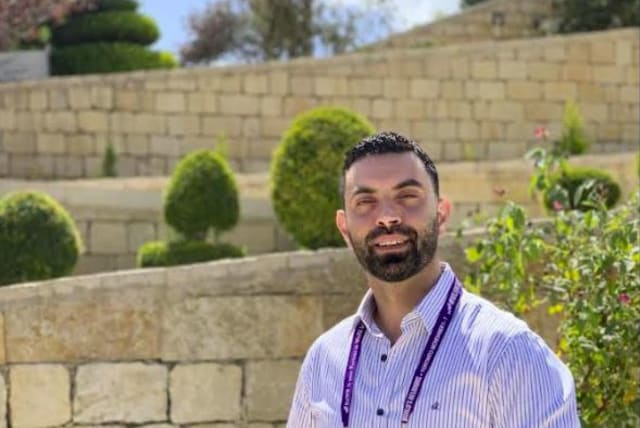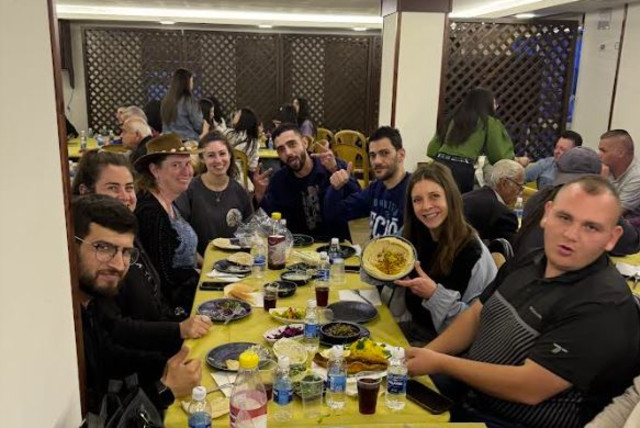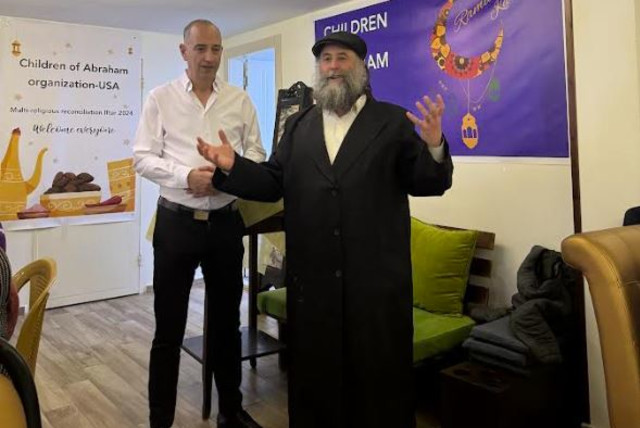Matisyahu’s ‘One Day’ resonates amid unique Interfaith Iftar meal with Israelis and Palestinians

Jamous believes that the Iftar meal and the petition are not at all the culmination of his efforts, but rather merely a first step in creating a strong Palestinian-Israeli peace movement.
A festive interfaith Iftar meal was hosted last week in Mount Gerizim in Samaria, organized by The Children of Abraham Project, a US-based organization founded in 2018 whose goal is to bring communities in conflict together, especially Jews and Muslims. The Jerusalem Post reached out to Mohamad Jamous, the director of the organization’s programs in the Holy Land and the main organizer of the Iftar event, to hear more about it.
How did the event come to be?
Jamous: “I initiated the idea and shared it with the Jewish and Arab coordinators of the program, and we discussed the event arrangements. It was important for me to personally arrange the location and provide for safe transportation for the invitees.
We then sent out information and invitations through social media, extending the invitations to Christian, Muslim, and Jewish participants, including religious leaders who were keynote speakers at the event.”
When asked about the significance of the location he chose in Mount Gerizim, Jamous explained that, due to the war, he believed that the most suitable place for both Palestinians and Israelis, Arabs and Jews, would be the homeplace of the Samaritan community, accessible to everyone without any checkpoints or obstacles, and providing security for everyone.
“In Ramadan last year, I organized the same event in the Dead Sea region, and 200 people of different religions and nationalities participated. But this year, everything became even more difficult, and what concerned us was ensuring protection and security for both Arab and Jewish participants, which would not have been achieved being so close to Jericho,” he explained.
Jamous also said that the timing of the event had to be postponed from its original date due to violent clashes in the Nablus area between Palestinians and the IDF. In the end, 150 people joined this year’s multi-faith Iftar meal, roughly half of them Palestinians from the West Bank and the other half Jews from various parts of Israel.
Did you face any challenges in organizing such an event during the war? Was anyone hesitant to come or participate?
“Challenges always exist in organizing such events, including threats directed at us or our participants for the mere act of participating. So yes, fear, tension, and anxiety always accompany us in these events,” he added. “But we insist on working on the path of peace and building such programs in the Holy Land, which largely overwhelms any challenge mentioned.
“Some people are hesitant and afraid to attend,” Jamous continued, “but I try to make my constant presence at the site increase comfort, safety and hope for participants.”
Jamous described his excitement as, after weeks of rigorous planning, the date finally arrived. “I made sure to welcome every single one of the participants personally. We usually begin each program with speeches delivered by spiritual leaders – Jewish, Muslim, Christian, and this year also Samaritan – regarding the need for unity, trust building and restoring confidence in each other. We also give some participants the space to share their feelings and stories, and open the door to discussion,” Jamous told excitedly. “We then split participants into smaller groups and give each group a specific topic to discuss, to then be shared again with the rest of the audience.”
After the discussion sessions participants enjoyed some free time to converse, and then finally came the time for the meal. “We conclude each program with reading texts from the Qur’an and the Bible, and then move on to sing songs about peace and unity among peoples and nations,” he added, retelling with emotion about how participants ended the night by embracing each other and singing “One Day” by Matisyahu.
The Children of Abraham Project
The organizing party, the Children of Abraham Project, describes their three fundamental principles as: rejecting hatred and death, acknowledging that communities do evil to each other, and believing that humankind is holy in its deepest nature.
Some of the projects led by this unique organization include a delegation to Ahmedabad in India featuring a rabbi and an imam, who lived and worked together in a poverty-stricken neighborhood in Ahmedabad, where thousands of people from different religions were killed based on religious hate. They also established a Jewish-Muslim project in Uganda, where 13 Jews and Muslims worked together in a rural school. A third project, still ongoing, operates in Ethiopia and Kenya, where volunteers tend to hundreds of orphans, also victims of interreligious and inter-tribal conflict. Many of these projects also resulted in short films, which can be found on the organization's website and in media outlets.
The Children of Abraham Project proudly states its unique approach, which seeks to include the Orthodox community. This is in contrast to other organizations, which, while working for reconciliation, do not engage this community, assuming that they have no interest in bridging the gap between Jews and Muslims.
In the Middle East, the project started several years ago when a young Palestinian peace activist named Mohamad Jamous contacted the organization and asked what he could do to promote peace in this conflict-stricken region.
Jamous currently lives in Ramallah. He studied business administration at Al-Quds Open University and is now completing a master's degree in international law and diplomacy at the Arab American University in Ramallah. In addition to his work with the Children of Abraham Project, he coordinates what he refers to as “peace journeys,” as well as cross-border programs and intra-Palestinian think tanks, aiming to build a sustainable movement for peace across the region.
Jamous has worked in interfaith peace organizations in the region and abroad for the last 15 years, promoting connections of people from different religions, cultures, and backgrounds and aiming to change misconceptions about the conflict. Last year, Jamous participated in a program of the King Abdullah Bin Abdulaziz Center for Dialogue between Followers of Religions and Cultures (KAICIID) in Saudi Arabia, chosen from among 5,000 applicants – and the only Palestinian to participate in the program.
Jamous’s work for the Children of Abraham Project is voluntary. “Despite all the hardships and challenges of supporting my own family without a steady job, I truly believe that the path to peace is worth all the energy and hassle,” he added modestly.
What would you like to say to our readers?
“That in the midst of the war in Gaza, about 150 Palestinians and Israelis came together for an Iftar meal of reconciliation. That the purpose of the event was to bring our two people together and to tell our communities that peace is possible and that the time for hatred and war is over,” Jamous stressed.
“I urge readers to take part in our efforts. We are currently running a petition asking 10,000 Palestinians and 10,000 Israelis to sign a ‘Call for Peace and Reconciliation,’ he said. “I believe that by accepting the principles of the petition, we can move the two communities forward towards a lasting peace. These include the sanctity of life on both sides; the need to learn how to live together side by side in two states in the one holy land; putting an end to violence and expropriation of land; the need to create a vibrant Palestinian economy and combat unemployment; and more.
Jamous believes that the Iftar meal and the petition are not at all the culmination of his efforts, but rather merely a first step in creating a strong Palestinian-Israeli peace movement. “None of us – Israelis or Palestinians – can say that we have a clear conscience,” Jamous continued. “But, nevertheless, both people must reach out to each other and dedicate ourselves to ending hatred and violence and building a new Holy Land where our two peoples can live in peace.”
Mohamad Jamous can be reached at mohamad.jamous26@gmail.com.
Jerusalem Post Store
`; document.getElementById("linkPremium").innerHTML = cont; var divWithLink = document.getElementById("premium-link"); if (divWithLink !== null && divWithLink !== 'undefined') { divWithLink.style.border = "solid 1px #cb0f3e"; divWithLink.style.textAlign = "center"; divWithLink.style.marginBottom = "15px"; divWithLink.style.marginTop = "15px"; divWithLink.style.width = "100%"; divWithLink.style.backgroundColor = "#122952"; divWithLink.style.color = "#ffffff"; divWithLink.style.lineHeight = "1.5"; } } (function (v, i) { });


